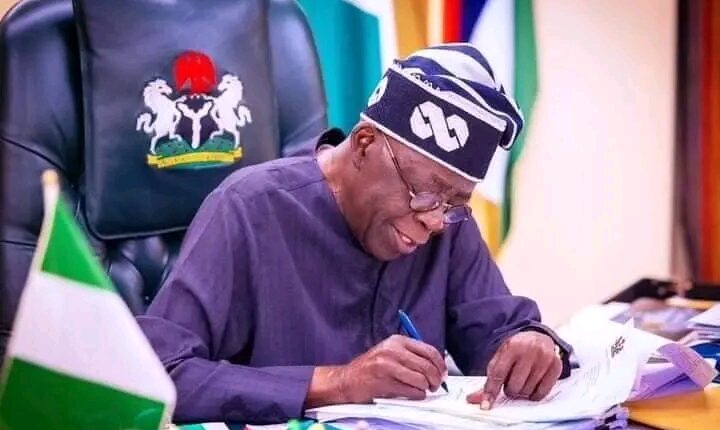In a sweeping reform aimed at revitalizing Nigeria’s oil and gas sector, President Bola Tinubu has dismissed Mele Kyari as the Group Chief Executive Officer of the Nigerian National Petroleum Company Limited (NNPCL) alongside the entire board.
The decision, announced on April 3, 2025, marks a significant shift in the administration’s approach to energy sector management, signaling an emphasis on efficiency and increased production output.
The presidency disclosed that the leadership overhaul was driven by concerns over stagnant production levels and a need for a fresh strategic direction.
In Kyari’s place, Bashir Ojulari has been appointed as the new Group CEO, with Musa Ahmadu-Kida assuming the role of non-executive chairman.
Performance-Based Reshuffle
Sources within the presidency indicate that the decision was based on performance metrics rather than tenure or political considerations.
One official explained that the previous leadership structure had struggled to achieve key targets, leading to stagnation in production levels.
The move intends to bring in industry experts who can drive meaningful reforms.
“The president made this decision because of the need for improved performance. The previous leadership was not delivering the expected results, and some of them became obstacles rather than solutions,” the official stated.
Nigeria has historically struggled to meet its Organization of the Petroleum Exporting Countries (OPEC) production quota.
The government has now set ambitious targets, aiming for a daily crude oil output of 2 million barrels by 2027 and 3 million barrels by 2030. Additionally, the gas production goal is set at 10 billion cubic meters by the end of the decade.
The New Leadership and Strategic Direction
The newly appointed 11-member board comprises professionals with extensive industry experience. The restructuring seeks to prioritize efficiency, eliminate political interference, and enhance investment appeal in the sector.
In addition to Ojulari and Ahmadu-Kida, the new board includes Adedapo Segun as Chief Financial Officer, alongside six non-executive directors representing Nigeria’s geopolitical zones.
These include Bello Rabiu (North West), Yusuf Usman (North East), Babs Omotowa (North Central), Austin Avuru (South-South), David Ige (South West), and Henry Obih (South East). Lydia Jafiya will represent the Ministry of Finance, while Aminu Said Ahmed represents the Ministry of Petroleum Resources.
The new board has been tasked with conducting a comprehensive review of NNPCL’s asset portfolio to optimize underperforming blocks and increase production.
One of its primary mandates is to ensure greater efficiency in crude oil refining, with an ambitious target of increasing refining capacity to 200,000 barrels per day by 2027 and 500,000 barrels per day by 2030.
The administration is also seeking to attract $30 billion in investments by 2027 and $60 billion by 2030.
Industry Reactions and Expectations
Stakeholders in the oil and gas sector have responded positively to the restructuring, expressing optimism about the potential for increased production and improved sector performance.
The Independent Petroleum Marketers Association of Nigeria (IPMAN) commended the move, urging the new leadership to expedite the rehabilitation of the nation’s refineries.
IPMAN spokesperson Chinedu Ukadike emphasized the importance of ensuring the Port Harcourt, Warri, and Kaduna refineries operate at full capacity, which would not only enhance fuel availability but also generate employment opportunities.
Similarly, the Nigerian Association of Petroleum Explorationists (NAPE) lauded the appointments, describing them as a step towards greater efficiency and transparency in the sector.
The association stressed the need for improved investor confidence and commercial viability.
Additionally, the Crude Oil Refinery Owners Association of Nigeria (CORAN) called on the new board to implement policies that will position Nigeria as a refining hub, reducing the country’s reliance on imported petroleum products.
Addressing Sector Challenges
Despite the optimism, the new leadership faces significant challenges. Pipeline vandalism, crude oil theft, and inadequate investment in infrastructure have long hindered the industry’s growth.
The recent dispute between NNPCL and the Dangote Refinery over the naira-for-crude agreement further underscores the need for policy clarity and sectoral stability.
Professor Wumi Iledare, a veteran oil and gas expert, emphasized that the success of the new board would depend on its ability to implement reforms in line with the Petroleum Industry Act.
He also called for transparency in NNPCL’s operations, particularly regarding asset divestment and refining capacity expansion.
With a new leadership team in place, the Tinubu administration has set ambitious goals for Nigeria’s oil and gas sector.
The focus on efficiency, investment, and refining capacity is expected to reshape the country’s energy landscape.
However, achieving these targets will require overcoming long-standing structural challenges.
As industry players and stakeholders watch closely, the success of this new direction will ultimately be measured by tangible improvements in production, investment, and economic impact.

